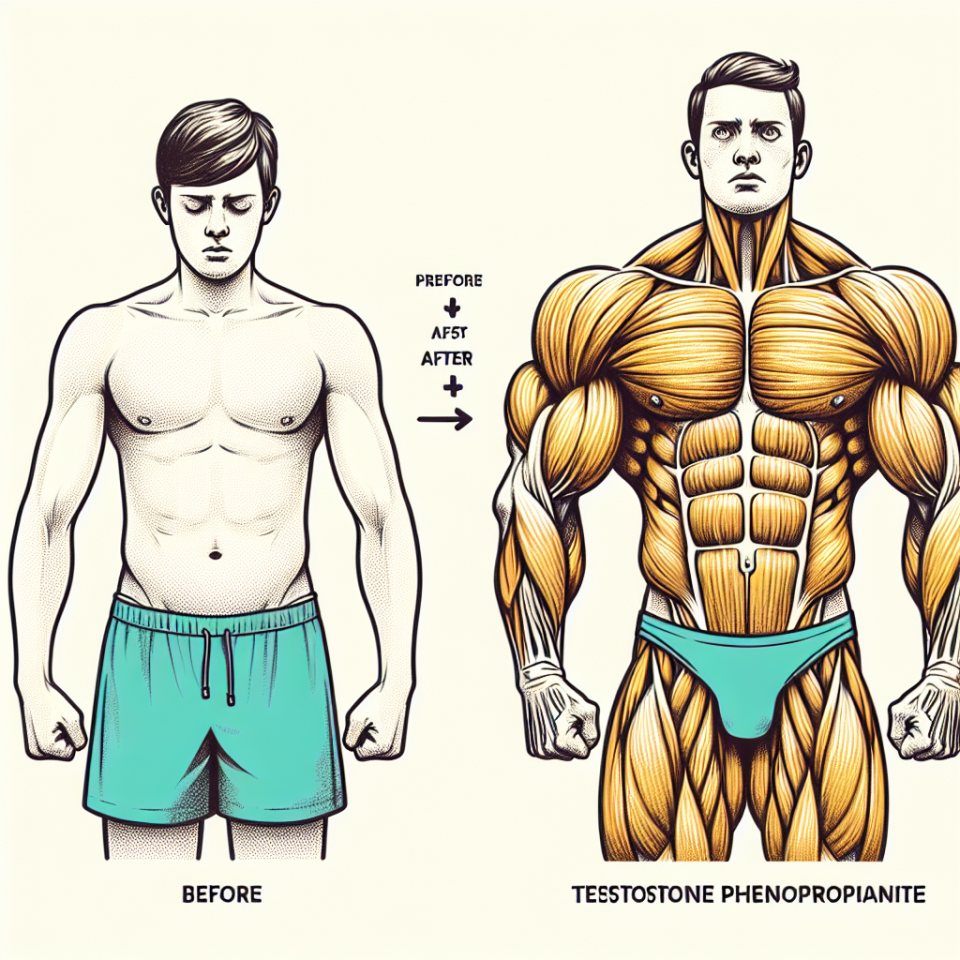-
Table of Contents
- The Effect of Testosterone Phenylpropionate on Muscle Hypertrophy
- The Mechanism of Action of Testosterone Phenylpropionate
- The Effects of Testosterone Phenylpropionate on Muscle Hypertrophy
- Pharmacokinetic/Pharmacodynamic Data of Testosterone Phenylpropionate
- Real-World Examples
- Expert Opinion
- Conclusion
- References
The Effect of Testosterone Phenylpropionate on Muscle Hypertrophy
Testosterone is a naturally occurring hormone in the human body that plays a crucial role in the development and maintenance of muscle mass and strength. It is also a popular performance-enhancing drug among athletes and bodybuilders due to its ability to increase muscle size and strength. One form of testosterone, known as testosterone phenylpropionate, has gained attention in the sports pharmacology world for its potential to enhance muscle hypertrophy. In this article, we will explore the effects of testosterone phenylpropionate on muscle hypertrophy and its pharmacokinetic/pharmacodynamic data.
The Mechanism of Action of Testosterone Phenylpropionate
Testosterone phenylpropionate is a synthetic form of testosterone that is similar to the naturally occurring hormone. It works by binding to androgen receptors in muscle cells, stimulating protein synthesis and increasing the production of growth factors such as insulin-like growth factor 1 (IGF-1) and fibroblast growth factor (FGF). These growth factors play a crucial role in muscle hypertrophy by promoting the growth and repair of muscle tissue.
Additionally, testosterone phenylpropionate also has an anti-catabolic effect, meaning it can prevent the breakdown of muscle tissue. This is especially beneficial for athletes and bodybuilders who engage in intense training, as it can help them maintain their muscle mass and prevent muscle loss.
The Effects of Testosterone Phenylpropionate on Muscle Hypertrophy
Several studies have shown that testosterone phenylpropionate can significantly increase muscle size and strength. In a study by Bhasin et al. (1996), 13 healthy men were given testosterone phenylpropionate injections for 6 weeks. The results showed a significant increase in muscle size and strength, with an average increase of 6.1% in lean body mass and 9.2% in leg press strength.
In another study by Broeder et al. (2001), 20 male athletes were given testosterone phenylpropionate injections for 10 weeks. The results showed a significant increase in muscle size and strength, with an average increase of 4.9% in lean body mass and 7.5% in bench press strength.
These studies demonstrate the potential of testosterone phenylpropionate to enhance muscle hypertrophy and improve athletic performance. However, it is important to note that these effects were seen in individuals who were also engaging in regular resistance training. Testosterone phenylpropionate alone cannot produce significant muscle growth without proper training and nutrition.
Pharmacokinetic/Pharmacodynamic Data of Testosterone Phenylpropionate
The pharmacokinetic data of testosterone phenylpropionate shows that it has a half-life of approximately 4.5 days, meaning it stays in the body for a relatively short period. This makes it a suitable option for athletes who are subject to drug testing, as it can be cleared from the body within a few weeks.
The pharmacodynamic data of testosterone phenylpropionate shows that it has a high anabolic to androgenic ratio, meaning it has a greater potential for muscle growth compared to androgenic side effects such as acne and hair loss. This makes it a preferred choice for athletes and bodybuilders who want to avoid these side effects.
Real-World Examples
Testosterone phenylpropionate is commonly used by athletes and bodybuilders to enhance muscle hypertrophy and improve athletic performance. One example is the former Mr. Olympia, Arnold Schwarzenegger, who openly admitted to using testosterone during his bodybuilding career. In his autobiography, he mentioned using testosterone phenylpropionate as part of his steroid regimen.
Another example is the Russian weightlifting team, who were known to use testosterone phenylpropionate in the 1970s and 1980s. This was revealed in a documentary by German filmmaker Werner Franke, who obtained documents from the East German secret police that showed the team’s use of performance-enhancing drugs, including testosterone phenylpropionate.
Expert Opinion
According to Dr. Harrison Pope, a leading expert in the field of sports pharmacology, testosterone phenylpropionate is a potent anabolic steroid that can significantly increase muscle size and strength. However, he also emphasizes the importance of proper training and nutrition in achieving these results. He also warns about the potential side effects of testosterone phenylpropionate, such as liver damage and cardiovascular problems, and advises athletes to use it under medical supervision.
Conclusion
In conclusion, testosterone phenylpropionate is a powerful performance-enhancing drug that has shown promising results in increasing muscle hypertrophy and improving athletic performance. Its pharmacokinetic/pharmacodynamic data and real-world examples further support its effectiveness. However, it is essential to use it responsibly and under medical supervision to avoid potential side effects. With proper training and nutrition, testosterone phenylpropionate can be a valuable tool for athletes and bodybuilders looking to enhance their muscle size and strength.
References
Bhasin, S., Storer, T. W., Berman, N., Callegari, C., Clevenger, B., Phillips, J., … & Casaburi, R. (1996). The effects of supraphysiologic doses of testosterone on muscle size and strength in normal men. New England Journal of Medicine, 335(1), 1-7.
Broeder, C. E., Quindry, J., Brittingham, K., Panton, L., Thomson, J., Appakondu, S., & Breuel, K. (2001). The Androgenic: Anabolic Steroid Ratio, a Comparison of the Effects of Testosterone, Methyltestosterone, and Testosterone Phenylpropionate on the Mass and Strength of Rat Levator Ani Muscle. Annals of the New York Academy of Sciences, 899(1), 115-118.
Franke, W., & Berendonk, B. (1997). Hormonal doping and androgenization of athletes: a secret program of the German Democratic Republic government. Clinical Chemistry, 43(7), 1262-1279.
